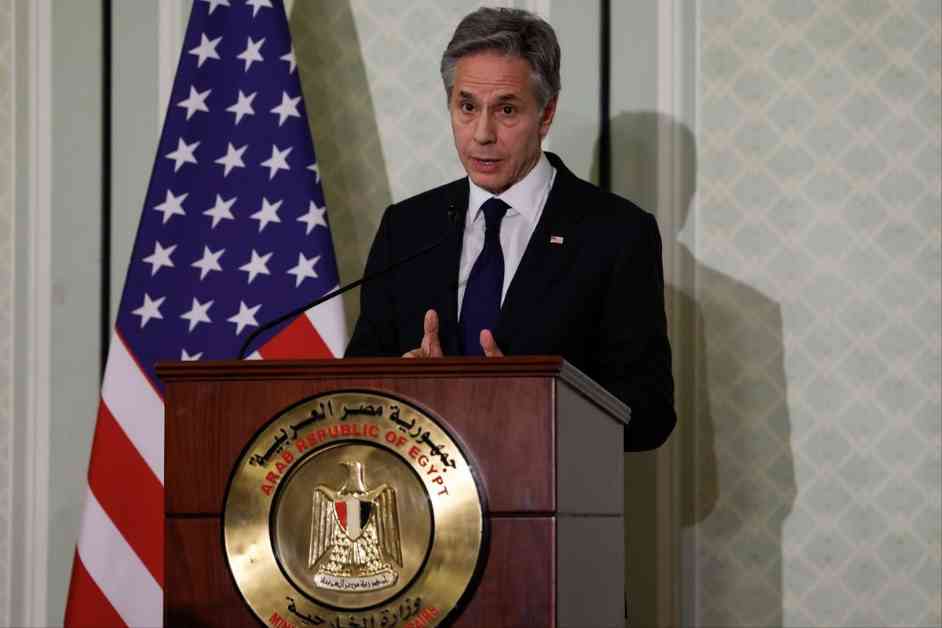US Secretary of State Antony Blinken has landed in Israel for crucial talks on a potential ceasefire agreement amidst ongoing negotiations between Hamas and Israel in Qatar. This marks Blinken’s ninth visit to the region since the conflict erupted in October, highlighting the urgency and importance of finding a resolution to the violence that has plagued Gaza.
Blinken’s Arrival in Israel
As Blinken arrived in Israel, negotiations in Qatar between Hamas and Israel were at a critical juncture. The hope is that his presence and diplomatic efforts can help facilitate a ceasefire and secure a potential hostage exchange. The situation on the ground remains dire, with reports of continued Israeli airstrikes resulting in the deaths of more than 20 individuals, including women and children, in a recent strike.
US President Joe Biden has expressed optimism about the progress towards a ceasefire deal, suggesting that an agreement may be within reach. However, Hamas has pushed back against these assertions, dismissing them as an “illusion.” The key sticking points in the negotiations revolve around the extent of Israeli troop withdrawal from the Gaza Strip, as demanded by Hamas.
The Ceasefire Negotiations
According to a Hamas source cited in Saudi media, the proposed agreement includes the Israel Defense Forces (IDF) maintaining a reduced presence along the Philadelphi Corridor, a narrow strip of land along Gaza’s southern border with Egypt. Israeli sources, however, have indicated that alternative security measures along the border could potentially offset a full withdrawal of Israeli troops from the area in the initial phase of the deal.
The Israeli military’s campaign in Gaza was launched in response to an unprecedented attack on southern Israel in October, resulting in significant casualties and the taking of hostages. The toll of the conflict has been devastating, with more than 40,000 lives lost in Gaza since the outbreak of hostilities, according to Hamas-run health authorities.
A previous ceasefire agreement reached in November saw the release of some hostages by Hamas in exchange for a temporary ceasefire and the freeing of Palestinian prisoners from Israeli jails. Despite these efforts, a significant number of hostages remain in captivity, with ongoing negotiations aimed at securing their release and establishing a lasting peace.
Challenges and Obstacles
While President Biden has expressed optimism about the prospects for a ceasefire deal, Israeli Prime Minister Benjamin Netanyahu has reiterated the importance of ensuring Israel’s security interests are protected in any agreement. Netanyahu has emphasized the need for certain non-negotiable security measures while accusing Hamas of being uncooperative and prolonging the conflict through obstinance.
Hamas, on the other hand, has rejected the latest hostage proposal discussed in Doha, attributing blame to Prime Minister Netanyahu for introducing new conditions that hinder progress in the negotiations. The group has accused Netanyahu of setting unrealistic demands and obstructing efforts to reach a resolution, ultimately prolonging the suffering of hostages held in Gaza.
International Mediation and Pressure
The involvement of international mediators, including Secretary Blinken and other diplomatic channels, underscores the global effort to broker a ceasefire and bring an end to the violence in Gaza. The United States has played a significant role in facilitating negotiations between the warring parties, with President Biden emphasizing the importance of finding a peaceful resolution to the conflict.
Despite the challenges and obstacles that persist in the negotiations, there remains a collective commitment to finding common ground and reaching a mutually acceptable agreement. The stakes are high, with the lives of countless individuals hanging in the balance as the conflict in Gaza continues to exact a heavy toll on both sides.
As Secretary Blinken continues his diplomatic efforts in Israel and the region, the hope is that his presence and intervention can help pave the way for a lasting ceasefire and a sustainable peace agreement. The road ahead may be fraught with challenges, but the imperative of ending the violence and restoring stability to the region remains paramount for all parties involved.












